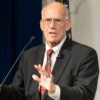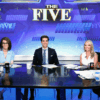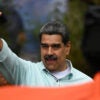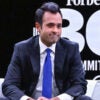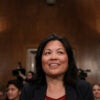Editor’s note: This is a lightly edited transcript of today’s video from Daily Signal Senior Contributor Victor Davis Hanson. Subscribe to our YouTube channel to see more of his videos.
Hello, this is Victor Davis Hanson for The Daily Signal.
We’re into about the fourth or fifth day of the Los Angeles fires, and people are commenting on the complete systems breakdown.
It’s a word that sociologists, historians, and archaeologists use—“systems breakdown”—but also “systems collapse,” the collapse of complex societies; for example, the Mycenaeans and others. But it’s the idea that the system becomes so complex that very few people operate it.
And when those people are incompetent, and they tend to be bureaucratic and ossified, calcified, then the entire system is so dependent upon them, it collapses.
That’s what we’re seeing in Los Angeles. It is a multifaceted breakdown. The insurance industry is overregulated. It doesn’t trust the state to police, give the people security in their homes. It doesn’t trust their ability to stop fires.
They understand there’s no water policy that’s logical in the state. And they want out. … It’s a fire problem. We have lost the ability to fight fires that our grandfathers, over decades, practiced and honed to a fine art.
We have lost control, as I said, of water. The water issue is a disaster.
We have plenty of water. We had a brilliant California water project, Central Valley project, and we abused it and have not built a reservoir in nearly 40 years outside of Los Angeles.
It is also a regulatory problem, that we overregulate so we do not allow people to expand their homes, fix their homes, improve their homes, build their homes.
And finally, it’s a “diversity, equity, and inclusion” [problem]. This is what I want to get to, because … that’s the most controversial. … I think we should look at this in a historical perspective. Anytime an ideology trumps empiricism, meritocracy, investigatory efforts, just disinterested inquiry and knowledge, then you’re going to have a disaster.
And it can be on the Left, with communism and the commissar system. So, the Red Army, let’s say in 1942, was saying it’s not ideologically correct to retreat in front of the German army; therefore, they lost 650,000 people in the Kyiv pocket.
It can also be ideologically on the Right, where National Socialism says to the German arms industry, we have to have V-2 rockets, even though it was one of the most inefficient ways of delivering payload to the target, versus a pedestrian four-engine bomber, which they never made.
But in our case, when you take a person’s superficial appearance—in the case of race—or their beliefs that are ideological, whether it’s religious, or it’s an emphasis on one’s sexual orientation, or whether it’s an interest, on one’s gender, male, female, etc., and you put that over empirical investigation, then you’re not going to be able to, in a scientific matter, solve a problem.
And so, when we looked at these people, we have a $700,000 a year utilities czar in Los Angeles, and she cannot explain why there was not enough water, at least in a convincing way, because she’s never had to, because she was ideologically correct. You have an assistant fire chief who said, if women can’t—if I can’t carry out a man [out of a burning building], then that’s not on me. It’s the man shouldn’t be there.
It’s like saying if a child fell down a well, and I’m not physically strong enough to retrieve him and save him, that’s his fault. He shouldn’t have been in the well. Why does a person say that? Because she knows that she was appointed to that position on other criteria.
The same thing holds true, no need to get into the mayor, who people voted [for] as a DEI candidate. She said at one point, a few years ago, “Don’t blame the homeless for these fires.” So, we get—in conclusion in the Los Angeles catastrophe, there are whole areas of empirical inquiry that are put off- limits. You cannot talk about the homeless and whether there was a homeless person who was out in the hills, to get warm lighted a fire.
It’s a legitimate topic of inquiry. It’s happened. You can’t talk about—[Los Angeles Mayor] Karen Bass, as I said, said, “Don’t talk about that,” in the past. You cannot talk about the fire department because it is run by people who were appointed primarily because of the DEI criteria and to do so makes you a homophobe.
You cannot talk about fires and the lack of forest safety, forest ecology, because to do so challenges the green ideology.
I could go on. But until the society says that we are going to have free speech, no topic is taboo, and we can find the answer to questions by symptomology—we look at all of the evidence, and then we make a diagnosis. …
And then we make a prognosis. Until we can do that without the influence or the tyranny of these ideologies—in our case, our generation, it’s “diversity, equity, inclusion,” and radical environmentalism that preclude free discussion and the pathway to the truth, we’re going to have more Los Angeleses, I’m afraid to say. …
Thank you so much for tuning in today. Please subscribe to The Daily Signal for our next episode.
We publish a variety of perspectives. Nothing written here is to be construed as representing the views of The Daily Signal.
